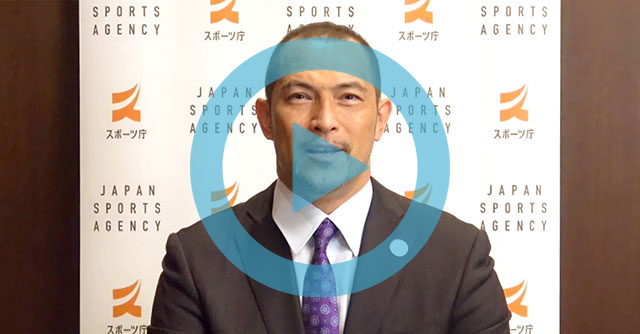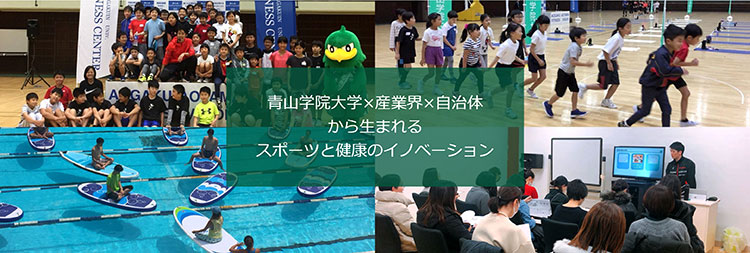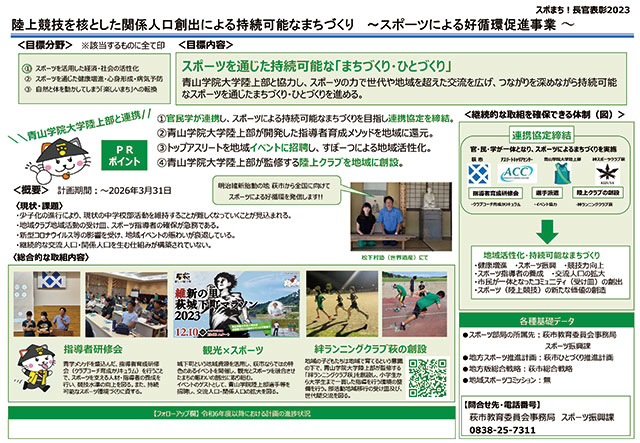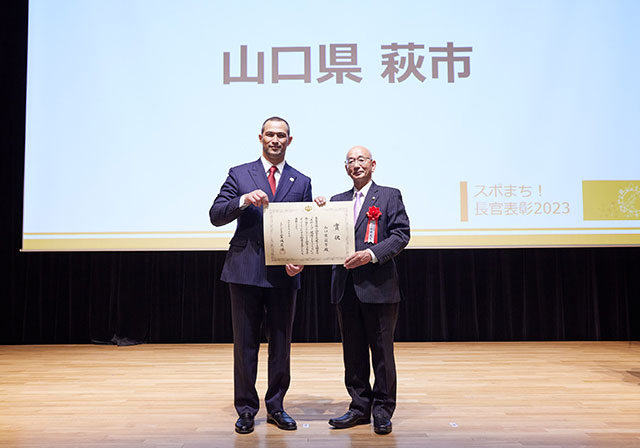Talking about training "local sports instructors"
Efforts to develop "new sports instructors" from the perspective of contributing to society
Starting in 2023, the initiative to "transition sports club activities to local club activities and community activities *1" will begin, and there is an urgent need to train local sports instructors across the country. In response to this societal demand, our university has developed a new training curriculum together with the Athlete Career Center (ACC), a member organization of the Aoyama Gakuin University Sports and Health Innovation Consortium. In this article, we will discuss the "transition of club activities to local club activities" and the significance of our university's efforts to train instructors through a discussion between Koji Murofushi, Commissioner of the Japan Sports Agency, and Professor Susumu Hara of our university's College of School of Global Studies and Collaboration.
*1 This refers to a reform in which coaching of sports clubs on holidays at public junior high schools, which was previously handled by teachers, is transferred to external organizations such as local sports clubs, private companies, and sports associations. The Sports Agency has designated the three-year period from 2023 to 2025 as a reform promotion period, during which it will work to transition sports club activities to local collaborations and local club activities, aiming to realize this as soon as possible depending on the actual conditions of each region.

Susumu Hara
Completed a master's course at the Waseda University Graduate School of Sport Sciences. Master's degree (Sports Science) (Waseda University). In 2004, he became the head coach of Aoyama Gakuin University track and field team (long distance block). In 2015, he led the team to its first overall victory in the 91st Tokyo-Hakone Round-Trip Collegiate Ekiden Race (Hakone Ekiden). Since then, the team has achieved brilliant results in numerous competitions, and in 2022, the team won the overall championship in the 98th Hakone Ekiden with a new tournament record. He has held his current position since 2019.

Koji Murofushi
He received his PhD in Physical Education from the Graduate School of Physical Education at Chukyo University. He participated in the Sydney, Athens, Beijing, and London Olympic Games, and won a gold medal at the 2004 Athens Olympic Games. He has held various positions, including Associate Professor at the School of Sports Science at Chukyo University, Professor at Tokyo Medical and Dental University and Director of the Sports Science Center at the Sports Science Organization, and Sports Director at the Tokyo Organizing Committee of the Olympic and Paralympic Games, before assuming his current position in 2020.
*Titles and titles are as of October 2023.
 What is the educational significance of sports?
What is the educational significance of sports?
--The "transition of club activities to local club activities" initiative is being implemented in stages. Please tell us about the educational significance of junior sports, as typified by club activities. (Titles omitted below)
Murofushi: Children's education is an investment in the future, and thinking seriously about education is essentially thinking about the future of Japan. The field of education is broad, but I believe that sports, among them, is something that uses the body and mind under various rules, and even cultivates the spirit. By playing according to the rules, we can foster human relationships and grow as people, so sports also play an important role in the educational aspect. By becoming familiar with such sports from a junior age, you can create a "foundation" that will allow you to be involved in sports throughout your life. After that, you can provide the mind and body with appropriate stimulation according to your age, which I believe will help with human development.
Hara: I am currently coaching students as the head coach of the track and field club (long distance block), and in addition to providing technical support, the core of my work is the philosophy of "nurturing human resources who will be useful to society." Through competition, students acquire social skills and problem-solving skills, such as planning and analytical skills, the ability to manage juniors, and respect for seniors. I believe that sports have that much power. Furthermore, sports during the junior years are useful for developing the mindset to understand one's own growth mechanism. They think about the process of becoming stronger and develop a spirit of challenge. This thinking ability will be used in various situations even after they grow up. For example, how should we think about and act in response to the challenges facing society in order to change the social structure? I believe that junior sports have the significance of developing such thinking. "Physical education" aims to maintain and improve mental and physical health throughout one's life and to develop the qualities and abilities to realize a rich sports life.
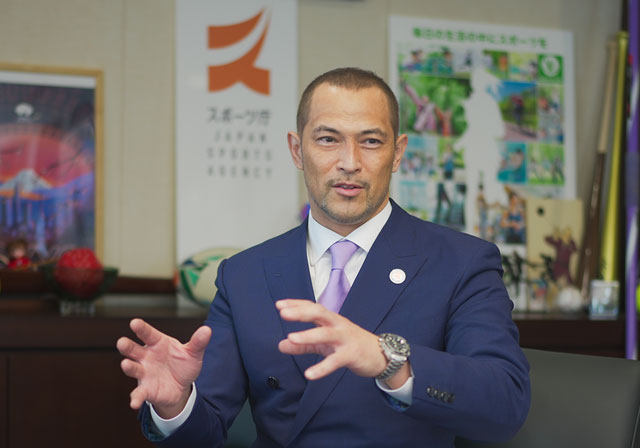 Commissioner of the Japan Sports Agency
Commissioner of the Japan Sports Agency
Murofushi: I agree with you. Furthermore, the key to thinking about "sports" is the difference with "physical education." While the goal of "physical education" is to maintain and improve mental and physical health throughout one's life and to develop the qualities and abilities to realize a rich sporting life, "sports" includes the aim of going beyond a healthy state and developing further abilities. I believe that every human being has a desire to maximize their abilities. Sports responds to that desire. The best example is the Paralympian who continues to challenge himself beyond the boundaries of his disability. People who cannot walk can walk with prosthetic legs, run, and even jump higher and farther than able-bodied people. There are still many possibilities like this in sports. I believe that further unlocking the possibilities of "sports" will also lead to improved life performance.
HaraSports, which continue to aim to be "better" than
the current situation, focus on the future rather than the past and have a "feedforward" orientation that respects autonomy. Feedforward values flat relationships that respect each other. In sports, I value the orientation of "coaching and athletes cooperating on an equal footing, finding good points and moving forward with a future-oriented mindset."
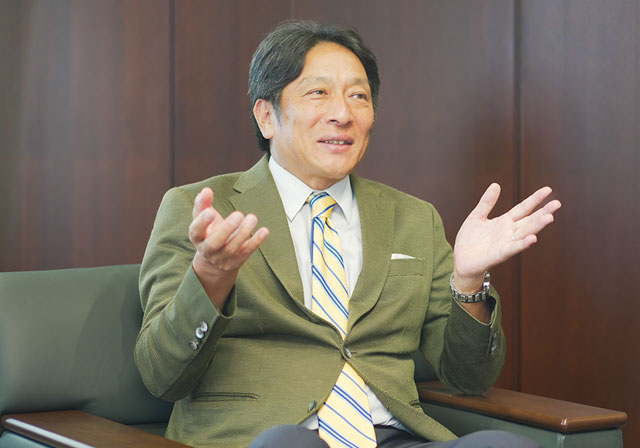 Professor Hara (School of Global Studies and Collaboration)
Professor Hara (School of Global Studies and Collaboration)
 Regarding "Transition of club activities to local club activities"
Regarding "Transition of club activities to local club activities"
--So far we have talked about the educational aspects of sports, but what kind of social significance does the transition from club activities to local club activities have?
Among the various meanings of
Murofushi 's "transition of club activities to local club activities," I would like to put "liberation of sports," especially liberation from schools, first. Until now, the mainstream idea has been that "sports for students should be played at school." However, this means that many people will leave sports as soon as they graduate from school. That's why I wanted to liberate sports from the confines of schools through this reform and move the sports venue to the community, so that more people can continue to enjoy sports. If children play sports in the community, they will have more opportunities to receive more specialized instruction and may be involved in more types of sports. I myself spent my childhood under my father, who was an Olympian and a university professor, and have been exposed to sports from a wide range of angles. In fact, sports are not just sports that you "play," but also sports that you "watch" as a spectator, sports that you "support" as a physical therapist or manager, and so on. Even after becoming a student, I would visit the university laboratory where my father worked, and witness various research and experiments, and I learned the joy of "learning" sports. I then went on to graduate school to specialize in physical education, and now I am involved in sports as a career. Thinking about it this way, I believe that in order to bring out the potential in children and broaden their future options, it is necessary for them to gain a wide range of experiences and perspectives, including a variety of sports.
If the transition of original sports to local areas progresses, we will be able to see the perspective of nurturing children throughout the community. I believe that the "transition of club activities to local club activities" will promote this movement of community cooperation. People with sports expertise will be able to demonstrate their abilities in the community, and if people become familiar with sports, it will contribute to extending healthy life expectancy and reducing medical expenses. In addition, deepening community ties will lead to crime prevention and foster social stability. For these reasons, I believe that the "transition of club activities to local club activities" initiative is one of the tools to solve local issues. These ideas of community cooperation are also in line with our school motto, "Salt of the earth, light of the world," which is based on the words of the Bible, and our idea of social contribution. Our university is already working on community development initiatives that utilize our campus sports resources, such as the "CAS Project*2," and from that perspective, I feel that the "transition of club activities to local club activities" is of great significance.
*2 In 2022, our university will collaborate with Sibuya Ward, Sagamihara City, and related organizations to launch the "Development of a New Sports Instructor Training System for the Future of Society" project (commonly known as the CAS project / CAS = Community Activator with Sports), a demonstration project to solve local issues through university sports.
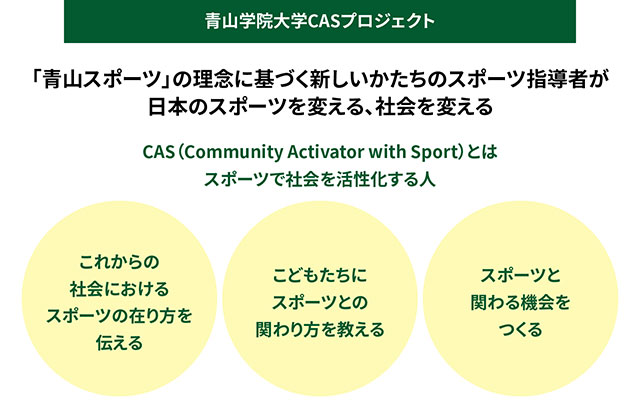
-- Our university is actively working to transition club activities to local club activities. Please tell us the purpose and background of this.
The aim of
the Haramoto University CAS project is to establish a "new image of a sports instructor." Currently, in the Japanese sports world, there are many instances of domineering instruction and irrational training based on past customs. As a result, various problems arise and children are abandoning sports. In order to improve this situation, we thought it was important to first increase the number of new sports instructors suitable for the new era. As a concrete measure, we developed a "club coach training curriculum" for sports instructors in collaboration with ACC, and are currently holding seminars in various places. Establishing a model case for sports instructor training from the perspective of a university involved in education will greatly contribute to creating a better society.
We are confident that Professor Hara, who has provided excellent instruction to develop top-level athletes, will be able to utilize his knowledge in
Murofushi 's "Transition of Club Activities to Local Club Activities" project.
Although
Haramoto University does not have a specialized faculty for sports, I think that this is actually a strength. Because I thought that being able to act with a free mind without being bound by traditional frameworks would enable me to realize a new type of leader who will change the world of sports. In order to breathe fresh air into the world of sports and expand its possibilities, I thought that we should utilize the knowledge that our university has accumulated as a comprehensive university with a diverse range of faculties in the humanities and sciences.
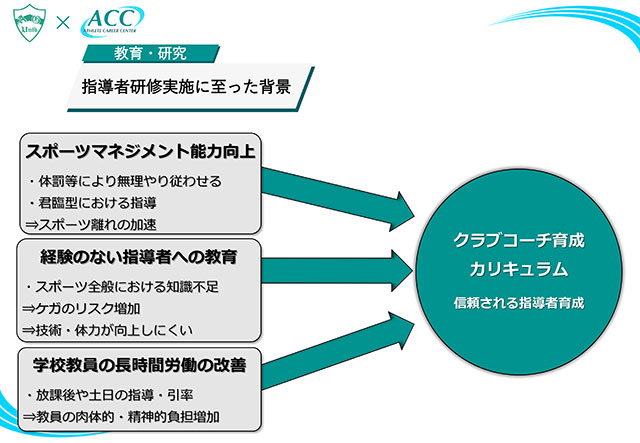
 The "Club Coach Development Curriculum" establishes a new image of sports instructors
The "Club Coach Development Curriculum" establishes a new image of sports instructors
--Could you tell us more about the training curriculum for local sports instructors?
The two core elements of
Hara's Club Coach Development Curriculum are team management and sports science. First, in the team management section, I will talk about the philosophy of coaching and organizational management. Until now, sports coaching in Japan has focused on the skills aspect, but the perspective of management regarding organizations and leaders has been lacking. To compensate for this element, I have combined the know-how I have cultivated over 20 years of coaching track and field and the Hakone Ekiden with the knowledge of our university as a comprehensive university to create a practical content. And the basis of this management section is also the image of a "servant leader" who embodies our university's "salt of the earth, light of the world". Servant leadership requires each individual to be autonomous, to have a firm understanding of the pros and cons of things, and to take the initiative in acting, as is required in the current era. The image of a leader that this curriculum aims for is not an authoritarian or controlling leader, but a "leader who develops people who can think and act for themselves."
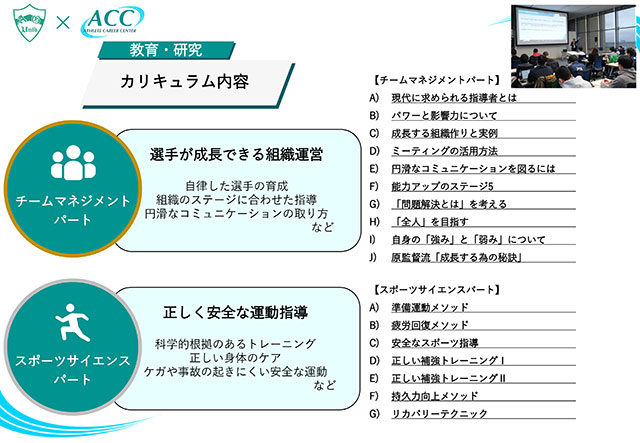
Murofushi: The Ministry of Education, Culture, Sports, Science and Technology is currently trying to develop people who can identify problems and act independently. Servant leadership fits this idea very well. In today's world of rapid change, we need to hone our perceptions and senses, and take the initiative in judgment and action, rather than just waiting for instructions from superiors. In order to develop children with these abilities, I think Aoyama Gakuin University 's efforts to focus on human development from the perspective of "management" are extremely significant. What about sports science?
Hara Sports Science places emphasis on the idea of "conditioning" to maximize the abilities of athletes. In order to prevent injuries, it is important for coaches to acquire the correct knowledge and perform proper "physical training." For this reason, the curriculum incorporates knowledge of preventive medicine, which is also emphasized in our university's "Sports Career Program *3." Based on this initiative, we would like to expand into a new initiative of "scientifically based training methods" under the guidance of instructors with specialized knowledge. We plan to make this curriculum a continuous system that also includes aftercare such as follow-up training.
*3 This is a regular program that has been offered at our university since 2015, mainly for athletic students. It aims to develop talent who can play an active role in the society of the future by utilizing the experience of athletes and acquiring data analysis and communication skills. It was selected as the top award winner in the "Excellent Initiative for Ensuring Learning Opportunities" award at the "UNIVAS AWARDS 2019-20" organized by the Japan University Sports Association (UNIVAS).
The idea behind Murofushi conditioning is important. Currently, the Sports Agency has published on its website a "self-check" that allows people to know the state of their own physical functions, as well as exercise methods aimed at maintaining and improving physical functions. In this website, specific methods are explained in videos, and efforts are being made to enable more people to enjoy sports safely. Traditionally, the standard for warm-up exercises was for everyone to do the same exercises, like radio calisthenics. However, in reality, each person's physical characteristics are different. You can expect better results by doing exercises that are suited to you, such as your age and muscle condition.
The track and field club has been proactively adopting the "self-check" devised by
Director Hara, and we have already seen good results. With regard to training, too, we need to move away from the traditional realm of intuition and willpower to a more scientific and rational one based on data and knowledge.
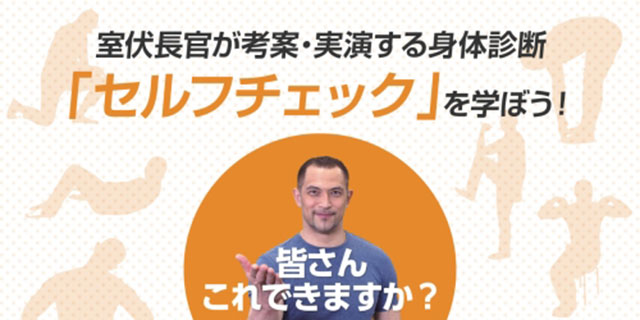
--Please tell us your future outlook for the "transition of club activities to local club activities" and your university's efforts.
Murofushi: I believe that sports have great potential to have a big impact on society. With the cooperation of Professor Hara, one of the top coaches in Japan, I hope that this project will unlock the potential of sports and change society in a new direction.
The vision of the future that
the Hara Sports Agency envisions is also a guideline for the future of Japanese society. I would like to work hard at the field level to make that ideal a reality. After a long time, about 70 years since the end of the war, the progress of club activities is now at a major turning point. Many challenges are expected to be overcome, but in cooperation with the Sports Agency, we intend to move local sports "forward." First of all, we aim to make our university's efforts a model case, and while accumulating achievements and trust in the field, we would like to expand the scope of our activities nationwide.
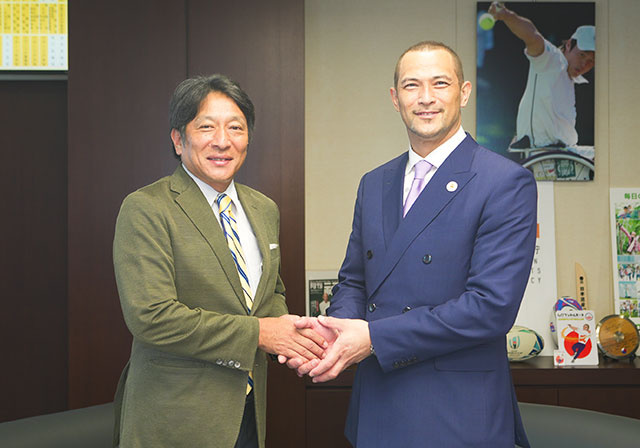
Message from Director General Murofushi
Aoyama Gakuin University Sports and Health Innovation Consortium
The Aoyama Gakuin University Sports and Health Innovation Consortium is a joint public-private-academic initiative that responds to the needs of society by turning the seeds of sports and health that the university has cultivated into a business. Even before the consortium was established, the university had been actively working to give back its academic and sports assets to the local community. In 2020, the university was certified by the Sports Agency for the "Creation of a Regional Revitalization Center Using University Sports Resources and Support for the Placement of University Sports Administrators Project," and has now decided to launch a new framework for "regional collaboration in the field of sports" as a consortium.
The main initiative of this consortium is the "CAS Project." The CAS Project aims to train "local sports instructors" who are needed for the "transition of club activities to local club activities" initiative, and to become a model case for similar initiatives nationwide. The basis of the project is the "Club Coach Development Curriculum." This curriculum was jointly developed by our university and the Athlete Career Center, a participating corporation of the "Sports and Health Innovation Consortium." The curriculum is composed of two pillars: "team management," which focuses on the development of humanity, and "sports science," which is based on preventive medicine, and is a practical content aimed at training sports instructors. In the future, we plan to expand the circle of excellent sports instructor training nationwide through seminars using this curriculum and various sports events.
Aoyama Gakuin University Sport and Health Innovation Consortium and the CAS Project will expand the possibilities of sports through various initiatives.
2023 Sports and Healthy City Development Excellence Municipality Awards
Aoyama Gakuin University and its Athlete Career Center have signed a partnership agreement with Hagi city, Yamaguchi prefecture, to develop excellent sports instructors and revitalize the local area through sports.
In Hagi city, it was becoming difficult to maintain junior high school sports club activities on campus due to the recent declining birthrate. Therefore, there was high hope for the initiative to "transition club activities to local club activities" and the training of local sports instructors was urgently needed. To meet this need, Hagi city, in cooperation with our university and the Athlete Career Center, implemented an "Instructor Development Workshop" based on the "Club Coach Development Curriculum" that incorporated the coaching methods of our university's track and field club. In addition, as an initiative for sustainable "town and human development" through sports, Hagi city is developing a variety of initiatives, such as the establishment of the "Kizuna Running Club Hagi" supervised by our university's track and field club and the holding of sports events with our university's track and field club athletes as guests.
In recognition of these efforts, Hagi City was selected as an outstanding local government in the "Sports and Healthy Town Development Excellent Local Government Awards (commonly known as the Spomachi! Minister's Awards) 2023." The "Sports and Healthy Town Development Excellent Local Government Awards System" is a system established by the Japan Sports Agency in 2021. It was established to support local governments that are actively working towards "regional revitalization" and "town development" using sports as a legacy of the Tokyo 2020 Olympic and Paralympic Games.
With our joint project with Hagi City now being recognized by the Japan Sports Agency, our university will continue to focus on our efforts to establish a model case for "a new image of a sports instructor" and for supporting the "transition of club activities to local club activities."
